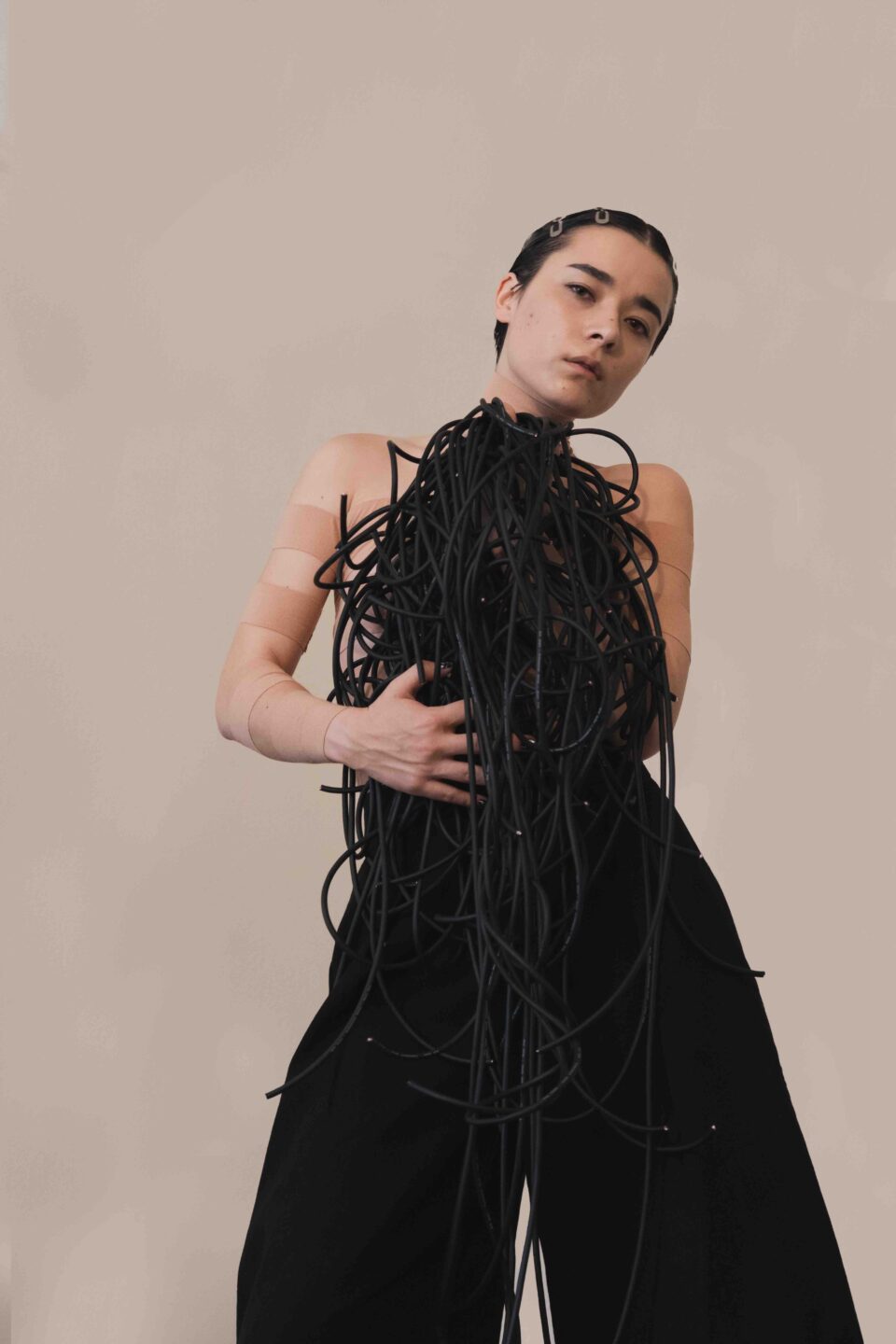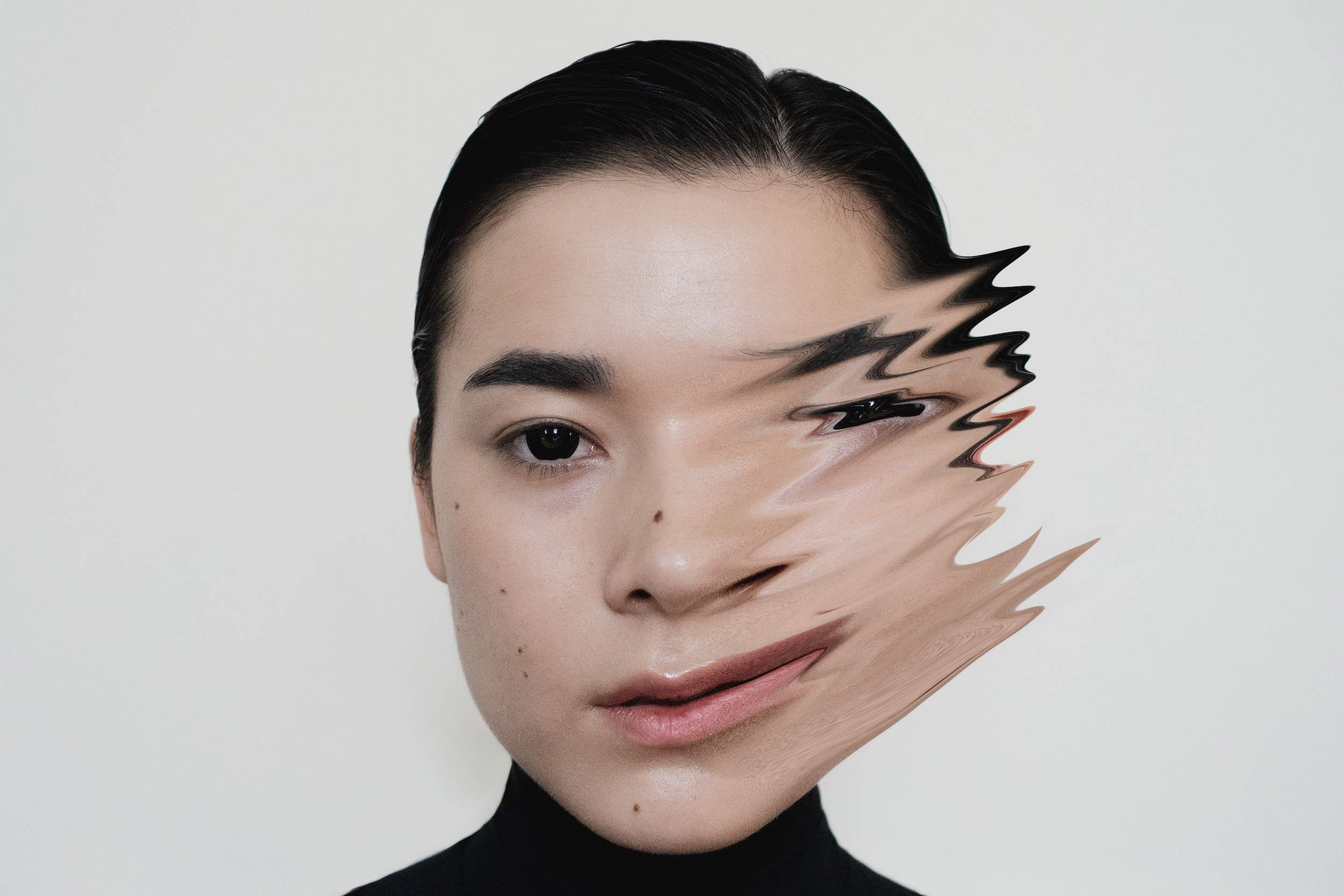Margaret Sohn is taking life lessons from a cyborg. Follow the Cyborg, the debut album from the Korean-American artist under the moniker Miss Grit, uses the relationship between cyborg and human creator as a way to examine—and ultimately dismantle—societally constructed binaries imposed on our understanding of identities. “It’s a powerful idea of a cyborg differentiating what was taught to them and what’s at their core, filtering out societal teachings,” Sohn says. “That’s something that a lot of women, non-binary people, or non-white people experience—that unlearning that happens when discovering your identity.”
Although the 10-song set follows the narrative of a cyborg’s creation and the relationship to their creator, the album gives us plenty of insight to Sohn’s own binary-breaking and norm-bending mindset. “I realize that I’m never going to completely figure myself out. I think the idea of getting closer to that kind of knowledge about your own self is something that’s really beautiful about life, and the cyborg being able to process their identity without ego involved, or emotions, is something that’s really beneficial. They’re able to see themselves pretty clearly, when seeing themselves in the context of the world. And I think that’s something that I’m always trying to practice—to not align with my ego or insecurities, to complete the way that I figure myself out in a healthier way, maybe.”
Follow the Cyborg is a complicated web of fluorescent-lit backing vocals, drudging guitar crunch, darting orchestral strings, and 2000s Brit-pop percussion. Sohn’s vocals are airy, but slightly detached; they recount the relational scenario in a matter-of-fact tone while the instrumentation breaks out into controlled chaos for brief periods, as heard on “Your Eyes Are Mine.” Over a steam-puffing rhythm, Sohn recounts: “We first met when I was learning / You were full and I was learning.” Sohn’s vocals are always at the center as the ever-observant cyborg takes notes of the relationship that’s unfolding. “I was kind of overly aware of all the musical rules that I grew up believing in when it comes to recording or producing,” they share. “My approach for this album was to allow myself to use more virtual instruments, like in a computer, and not be such a purist.”
“I was kind of overly aware of all the musical rules that I grew up believing in when it comes to recording or producing. My approach for this album was to not be such a purist.”
Sohn explains that movies have always been a huge inspiration for them. Her, Perfect Blue, and Ex Machina were a few films with cyborgian plots that struck a chord. They point to the latter’s misdirection of romantic tropes between the cyborg Ava (Alicia Vikander) and the coder Caleb (Domhnall Gleeson) who falls in love with her. “It’s complicated, because as the viewer you kind of want these two characters to be together, because it’s the love story that we’re all used to. But I love how she uses conventional romance for her own benefit and ignores how she’s supposed to treat romance, in a way. She uses her femininity, and man’s weakness, in her favor. That was something I hadn’t seen before.”
It wasn’t until reading Jia Tolentino’s Trick Mirror essay “Always Be Optimizing” and Donna J. Haraway’s Cyborg Manifesto that these technological beings and their filtering of the world began to take on a greater meaning. “I always find other stories helpful when reflecting on my own brain,” Sohn adds. “Having something more abstract or outside of my body to relate to is helpful for me. Hearing the cyborg’s story arc and the strength they find throughout their path to self-discovery is something that I really gravitated toward. I felt I could harness the power that comes from that story.”

“Hearing the cyborg’s story arc and the strength they find throughout their path to self-discovery is something that I really gravitated toward.”
Follow the Cyborg highlights society’s ever-growing struggle to keep up with both the onslaught of daily news and the rapid evolution of tech. But instead of a human protagonist, Sohn’s work sympathizes with artificial intelligence. The cyborg takes in everything: “I’ll be all I’ve consumed / I’m what you asked,” Sohn sings on opener “Perfect Blue.” As the album continues, the tension between the cyborg wanting to be their own being versus what their creator desires drastically increases. “I don’t wanna see everything anymore / I don’t wanna be everything anymore,” goes one gripping line on “Lain (Phone Clone).” It’s a sentiment we’ve grown well accustomed to via the heightened 24-hour news cycle and general overflow of information.
Sohn looks to these characters as inspiration when navigating identity in the era of social media. “I do really gravitate toward the cyborg’s way of approaching it and filtering out what direction the social media environment is trying to point you in and choosing your own destiny,” they say. “Being able to differentiate what it is that you want for yourself and what it is that other people are trying to tell you that you want for yourself? That’s probably the most useful tool for me when I go online, or see myself amongst other people or the outside environment.”
Similar to Ex Machina, Sohn explores how relationships can consume one’s identity. But with the cyborg’s resoluteness, one can subvert those constraints and steer themselves toward freedom or a new understanding of themselves. “My song ‘Your Eyes Are Mine’ is about the beginning of the relationship between the cyborg and the creator and how it’s very exciting to be introduced to someone else’s world. Oftentimes, at the beginning of relationships your sight is almost taken over by theirs, because it’s such an exciting thing to see the world in a different way.”
“Being able to differentiate what it is that you want for yourself and what it is that other people are trying to tell you that you want for yourself? That’s probably the most useful tool for me when I go online.”
Perception is a consistent motif within Miss Grit’s songs as, in their work, sight goes beyond its literal meaning. For Sohn, it’s important to discern true selves from imposed outside perception. “Even though our actual sense of sight is very literal and based in reality, when it goes through our brain and we’re processing what we’re seeing, that’s where things can get skewed.” There’s admiration for the cyborg’s neutral nature, they note. “Speaking from the cyborg’s perspective, you know you were created by this person—so much of who you are is because of that person. But you don’t want to be controlled, you want full autonomy over yourself.” In the end it’s about “choosing to be your own creator,” Sohn says. “I guess what it boils down to is being able to pick yourself up before someone else.”
Even though Miss Grit is an outlet to understand and interrogate their relationship to perception and choice, Sohn is trying to distance themself from how people will perceive this as their debut album. They point out a conversation they had recently with friend and album collaborator Pearla: “We were both saying how we’re drawn to music because it’s this nonverbal thing. It allows us to sit alone and document how we’re feeling and create a representation of who we are, or how we’re feeling, or our personality in a snapshot way. Being able to release it to other people is the beauty of that—allowing other people a snapshot of who you are.” FL









